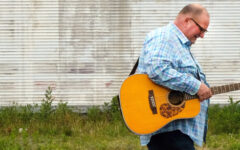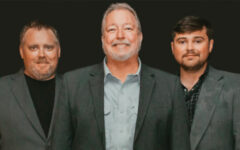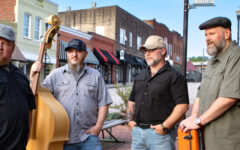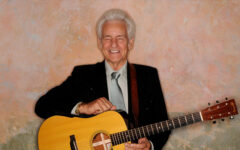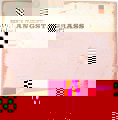 If you’re interested in something different, here it is. This is not for you purists – you know who you are. I would go so far as to say this is not for most bluegrass fans. It is not something I myself would listen to, as I do find the lyrics offensive at times, as many of you are sure to as well. It is of interest from the standpoint of observing the dissemination of bluegrass sounds and instrumentation into other musical forms.
If you’re interested in something different, here it is. This is not for you purists – you know who you are. I would go so far as to say this is not for most bluegrass fans. It is not something I myself would listen to, as I do find the lyrics offensive at times, as many of you are sure to as well. It is of interest from the standpoint of observing the dissemination of bluegrass sounds and instrumentation into other musical forms.
It was not that many years ago that the banjo and mandolin began to be accepted instruments in the country music world. Now they are quite at home in that world, and almost expected at certain times.
I would never have imagined though that these instruments, along with the dobro and fiddle, would find there way into a hip-hop mix!
So here’s the deal. Producer/mashup artist…ok, I’ll explain that last term.
A ‘mashup’ is a song created by combining two, or more, songs of differing genres (usually). Typically this is done using the lyrical content from one song and the instrumentation from another. This is widely popular in European pop. It is called a ‘mashup’ because you are basically mashing two thing together that wouldn’t normally find their way to the same space. There can be some legal issues involved in this practice and the entire genre (if you can call it that) has adopted a rather punk rock attitude and is considered part of the culture jamming movement.
Ok, back to the creator of this album. Rench is a singer/songwriter/producer/mashup artist who has recently released an mashup album of bluegrass and hip-hop. He’s calling the work Gangstagrass. The recording is available for free via download. It includes 22 tracks total. The tracks are basically hip-hop lyrics laid over a track that includes drums and bass along with original banjo, dobro, fiddle, and mandolin riffs.
The results are unique and have gained Rench some attention via posts on sites like boingboing.
Like I said, it is of interest to us as bluegrass fans because our sounds have found their way into a world most of us will never enter. Curious as to how that happened, I contacted Rench and had an email conversation with him about the recording.
What follows are some questions I put to Rench, and his very thoughtful and well articulated replies.
Brance: How did you develop an interest in bluegrass music?
Rench: My dad is from the panhandle of Oklahoma and I grew up with honky-tonk around the house. I rejected country music as a teenager and reconnected with it after college, getting back into honky-tonk. But you can’t be a country music fan and not have some love for bluegrass because it seems more directly connected to the roots of country music than any other style, keeping the acoustic instrumentation of the appalatian folk stuff, and using styles that you can trace back to the Carter Family and old time bands like that. So even though I usually write more in a honky-tonk style, I enjoy bluegrass for the way it has distilled certain aspects of the country sound and kept them true. I’ve been really inspired by Ralph Stanley as an artist and as someone who has maintained such a strong and clear style that spans through so much history of the genre. Right now I am particularly into his recording with the Clinch Mountain Boys in the 70’s when Keith Whitley and Ricky Skaggs were with him, they sound incredible together
Brance: How did you come up with idea of combining bluegrass with hip-hop?
Rench: I’m not the first person to think of combining country and hip-hop, but I feel like I have such a strong affinity for both that I am uniquely qualified to do it. I started experimenting with sampling pedal steel guitar licks for trip-hop songs maybe 9 years ago, which gradually grew into writing full country songs to hip-hop beats and recording live fiddle and pedal steel over them. The style drew mostly from 60’s honky-tonk, but it struck me that in some ways bluegrass was better suited for mixing with hip-hop because straight 4/4 with no swing is more common and there is much more of a choppy rhythmic drive to the style. It’s also very instrumentally driven with very little percussion, which leaves room to add beats over it when you sample it. So the idea that bluegrass samples would work out well was in my mind for some time. At one point last year I just decided it was time to do it – I had been recording and producing hip-hop tracks with local rappers and could pull out the acapellas from the tracks that would work the best with bluegrass. So I just called a moratorium on doing other things and spent a few weeks in the studio having a blast playing around with my bluegrass collection and programming beats.
Brance: How has it been received by the hip-hop community?
Rench: I don’t think you could say its actually been recieved by any community yet. I threw a website together so that people could download it for free, and I do get lots of positive feedback. But I would guess that the people who like it so far are people with eclectic tastes and not hardcore purists devoted to either bluegrass or hip-hop. I don’t think anyone that is a pure hip-hop fan will know what to make of Gangstagrass, it just won’t speak to them. Probably the same is true for avid bluegrass fans. If you are only into one of the genre’s that are being mixed here, the presence of the other is going to alienate you. But America is not as musically segregated as we may lead ourselves to believe – there are a lot of ipods with Jay-Z and Johnny Cash in the same playlist out there. My audience is the folks that appreciate American music in many forms.
Brance: I honestly don’t think the majority of bluegrass fans will take it well. The language will be to offensive for most of them.
Rench: Sorry about that, honestly. I wouldn’t want the lyrics to be a barrier to anyone’s enjoyment of the music. But I’m not doing this just to make something marketable either. I produced Ganstagrass from a perpective of total respect for the music it drew from, and there was no consideration towards softening the style of either side of the project. The hip-hop had to be real and unfiltered and the bluegrass had to be real bluegrass. Someone doing this to make it more accessible might have watered down the hip-hop, or used more cliche blugrass riffs that would sound cartoonish and sterotypical, but I am not about to offer people MC Hammer meets Hee-Haw. I don’t think I would be proud of this album if I had sanitized it for widespread acceptance. If someone doesn’t like Gangstagrass because of the language, thats how it goes. However, they may really enjoy Elkhorn Riders, my trip-hop remixes of the acoustic country duo The Lonesome Sisters.
If you are interested in the concept, visit Gangstagrass.com and download the album free of charge. Just be warned, the lyrics are unfiltered hip-hop as Rench put it.

